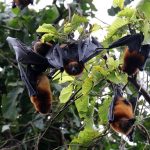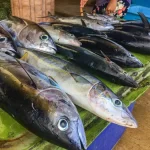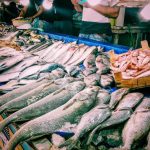1. Tumbe Fish Market in Pemba:
Tumbe Fish Market, located in Tumbe Village on the northern tip of Pemba Island, is one of the most vibrant and lively markets in the region. It is the primary fishing hub for local fishermen and traders, where fresh seafood is brought in daily. The market offers visitors a chance to experience the authentic daily life of the island’s coastal communities, as well as the opportunity to purchase some of the freshest seafood you can find.
Key Features of Tumbe Fish Market:
-
Fresh Seafood: Tumbe Fish Market is known for its wide variety of fresh seafood, including fish, octopus, prawns, lobster, crabs, and other local marine delicacies. Most of the fish comes directly from local fishermen who use traditional methods to catch their daily catch, ensuring that the seafood is of high quality.
-
Vibrant Atmosphere: The market is filled with activity, as fishmongers and fishermen haggle over prices and display their catches. The vibrant atmosphere gives visitors a glimpse into the daily life of Pemba’s coastal communities, making it a cultural experience as well as a place to purchase fresh seafood.
-
Traditional Methods of Fishing: Visitors to the market may see how traditional methods of fishing are still practiced in the area, from handlines and nets to simple wooden boats. Watching local fishermen bring their catches to shore offers insight into the importance of fishing as a livelihood for many people on the island.
-
Local and Tourist Engagement: The Tumbe Fish Market is a popular spot for both locals and tourists, and it offers a chance for visitors to interact with the community and learn about the fishing industry in Pemba. You can chat with fishermen and fishmongers and even ask about the different types of fish that are available for sale.
-
Culinary Delights: Many restaurants near Tumbe offer freshly prepared seafood dishes, and you can sample Pemba’s traditional seafood recipes. The market is a great place for food lovers who want to enjoy some of the freshest seafood available, whether prepared on-site or taken home for cooking.
Things to Do at Tumbe Fish Market:
-
Explore the Market: Walk through the market to observe the hustle and bustle, interact with locals, and see the various types of fish and seafood on offer.
-
Buy Fresh Seafood: For those who enjoy cooking, buying fresh seafood directly from the market is an excellent opportunity to prepare a delicious, authentic Pemba meal.
-
Cultural Experience: Engage with the locals, learn about their fishing practices, and discover the significance of the fishing industry in the region.
-
Photography: The market’s lively environment and the bright colors of the seafood create excellent opportunities for photography, capturing the vibrant life of Pemba’s coastal culture.
2. The Pemba Flying Fox:
The Pemba Flying Fox is one of the most iconic creatures of Pemba Island and is a significant part of the island’s natural heritage. This large fruit bat species is native to the island and is especially known for its impressive size and unique characteristics. The Pemba Flying Fox is not only fascinating due to its size but also because it plays a vital role in the island’s ecosystem.
Key Features of the Pemba Flying Fox:
-
Size and Appearance: The Pemba Flying Fox (also known as Pemba Fruit Bat, scientific name: Pteropus voeltzkowi) is one of the largest fruit bats in the world. It has a wingspan of up to 1.5 meters and is primarily known for its black fur, with a yellowish-brown face and a distinctive “fox-like” appearance. This bat species is nocturnal, which means it feeds at night.
-
Diet and Role in the Ecosystem: The Pemba Flying Fox primarily feeds on fruits, nectar, and flowers, making it an important pollinator for various plant species on the island. By spreading seeds and pollen, these bats help maintain the diversity and health of the forest ecosystems on Pemba Island. Their role as pollinators is especially vital for maintaining the biodiversity of the island’s native plants and trees.
-
Conservation Status: The Pemba Flying Fox is classified as vulnerable by the International Union for Conservation of Nature (IUCN) due to threats from habitat loss, hunting, and human encroachment. However, conservation efforts on Pemba Island, including habitat protection and awareness campaigns, aim to preserve the species and ensure its continued survival.
-
Habitats and Viewing Locations: The Pemba Flying Fox can be seen in various parts of the island, particularly in the forested areas of Ngezi Forest Reserve and other protected regions. They roost in trees during the day and are most active at night when they forage for food. These bats tend to form large colonies, and you might hear their calls and see them flying during dusk or dawn.
-
Educational and Ecotourism Value: The Pemba Flying Fox is an important aspect of the island’s natural heritage, and it is often included in eco-tours or wildlife observation trips. Local conservation programs and tours often highlight the role of the Pemba Flying Fox in the island’s ecosystem, educating visitors about the importance of protecting both the bats and the forests that sustain them.
Things to Do with the Pemba Flying Fox:
-
Wildlife Watching: You can observe the Pemba Flying Fox in its natural habitat during eco-tours in the forests, particularly around Ngezi Forest and other areas where the bats roost. Guides will often take tourists to known roosting sites where you can watch the bats settle during the day and take off at sunset.
-
Photography: These bats, with their impressive size and striking features, provide excellent photography opportunities, especially during twilight when they begin to take flight.
-
Conservation Awareness: Participate in conservation tours that highlight the importance of protecting the Pemba Flying Fox and other endangered species on the island. Some local organizations offer guided educational walks that explain the challenges and successes of bat conservation.
Conclusion: Tumbe Fish Market & The Pemba Flying Fox
Both Tumbe Fish Market and the Pemba Flying Fox represent unique aspects of Pemba Island’s vibrant culture and natural beauty.
-
Tumbe Fish Market provides a glimpse into the island’s rich fishing heritage, offering fresh seafood, a lively local atmosphere, and an opportunity to engage with the community. It is a must-visit for anyone interested in local food, culture, and the traditional livelihoods of the islanders.
-
The Pemba Flying Fox is an incredible species that plays a key role in the island’s ecosystem. Observing these magnificent creatures, learning about their role in pollination, and participating in conservation efforts adds a layer of eco-tourism and environmental appreciation to any visit to Pemba.
Together, they offer a combination of cultural immersion and natural exploration that showcases the unique character of Pemba Island, making it an essential destination for travelers interested in experiencing the island’s wildlife, culture, and sustainable practices.




